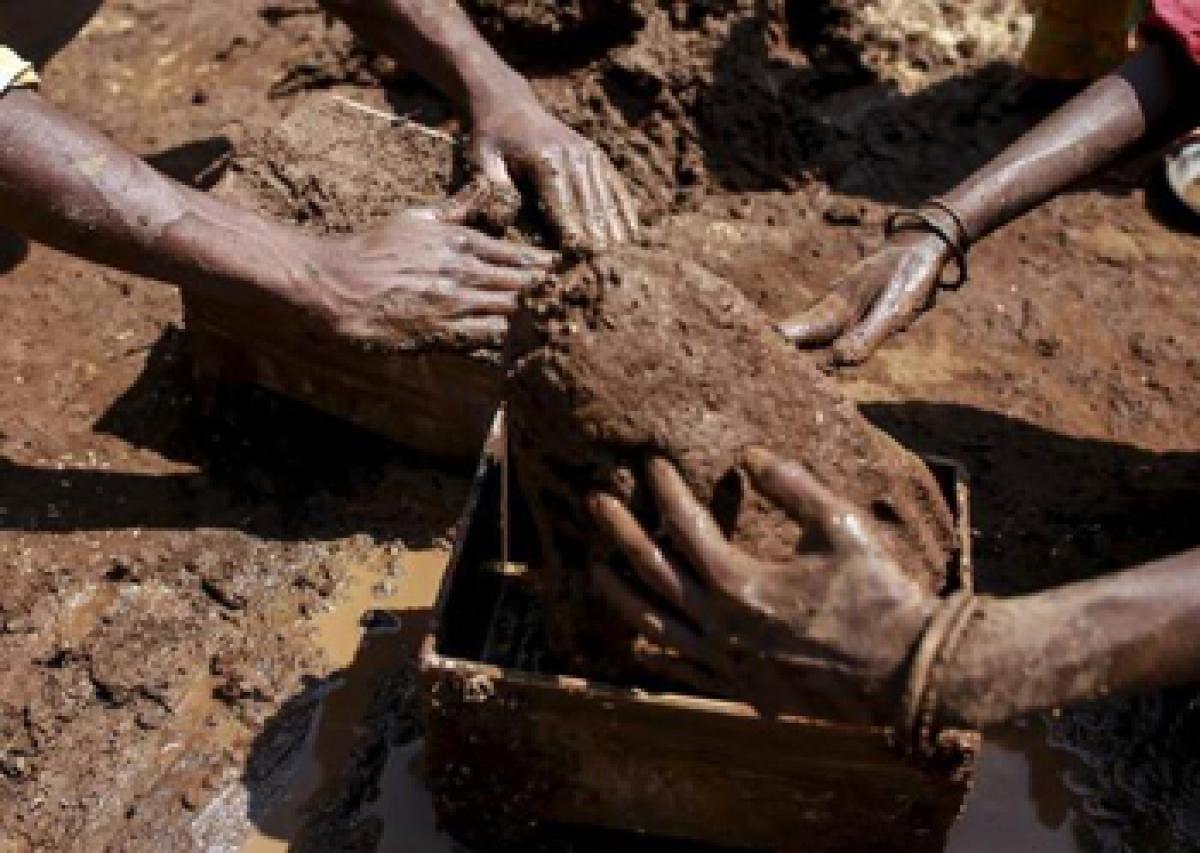Live
- Karnataka Temple Embraces Mechanical Elephant for Cruelty-Free Ceremonies
- Temple modelled after Ram Mandir to be constructed in US
- Property dealer shot dead in broad daylight in Ranchi
- Maharashtra: CM Fadnavis expands Cabinet; inducts 39 ministers
- Winter Session of UP Assembly from Dec 16; CM seeks cooperation of all parties
- AIADMK executive council meet passes sixteen resolutions, vows to make Edappadi CM again
- Manchu Family Feud Resurfaces in Jalpally
- Kerala Hindu leader gifts Rig Veda to Pope Francis
- 35 miners trapped under rubble in Afghanistan
- Lavanya Tripathi's Birthday Gift: Title Announcement of Her New Film ‘Sathi Leelavathi’
Just In

Thousands of brick kiln workers in Maharashtra are learning from activists that they have the right to a minimum wage, basic amenities and fair treatment but remain in debt bondage to owners who deny them these rights with impunity.
Thousands of brick kiln workers in Maharashtra are learning from activists that they have the right to a minimum wage, basic amenities and fair treatment but remain in debt bondage to owners who deny them these rights with impunity. The workers are largely landless Adivasi tribals who are forced to work at the kilns for half the year to pay off their debt. Entire families may work up to 14 hours a day for low or no wages, few amenities, no days off, and with no idea of how much money they still owe, activists said.
"The government, the police think bonded labour is when someone is tied up in chains or locked inside a room. They don't even acknowledge that these workers are bonded," said Ashok Jangale, director of community organisation Disha Kendra in Karjat near Mumbai. "We tell the workers they have a right to be paid, to not be beaten or abused, to have time off, to send their kids to school," said Jangale.
India is home to almost half the world's 36 million slaves, according to the 2015 Global Slavery Index compiled by the Australia-based Walk Free Foundation. Many Indians are duped into offering to work in farms, brothels and small businesses as security against a loan they have taken or a debt they have inherited. This is especially common in the construction industry, particularly in the unregulated sectors of brick-making and stone quarrying.
"The kilns themselves are mostly illegal, so keeping track of them is hard and they keep no records," said Chandan Kumar, ActionAid's national coordinator for the Bonded Labour Eradication Programme. "There's a lot of trafficking and bonded labour in the industry, but it is a profitable business and owners are usually politically connected, so the authorities turn a blind eye," he said.
There are no official figures on the number of people employed to cut, shape and bake clay-fired bricks, mostly by hand, in tens of thousands of brick kilns in India. Most of the workers are illiterate, keep no records, are paid a pittance and do not know how long it will take to pay off their debt. Some take out extra loans, for festivals and weddings, even while repaying the original one.
According to data compiled by the Centre for Science and Environment, at least 10 million people work in kilns, many located on the edge of towns and cities. At a kiln off the main road in Vanjarwadi village in Karjat, about 60 km (37 miles) from Mumbai, Ganesh Mukund said he had borrowed about 50,000 rupees ($750) from the owner and did not know how much he still owed.
He said he had previously worked in a kiln where a worker was beaten so badly, his arm was broken. "When we hear about such instances, we investigate the matter and file a case with the police. There may be up to five such cases a year, and there have even been instances of workers being killed. Although the police often put pressure on the workers to settle for some money, we tell the workers to persist," he said.
The state government appointed a vigilance committee in 2012 to check bonded labour after the deaths of several workers. A spokesman for the state's labour department said it was still keeping watch for alleged cases of bonded labour. Earlier this month, 564 brick kiln workers were rescued in southern Tamil Nadu state in one of the largest such operations in the country.
In Fansawadi village in Karjat, Rama Bai takes a break from shaping bricks to show an officer from Disha Kendra a small ruled notebook. It has daily logs since December, when the working season began, of the number of bricks her family made every day. Rama Bai borrowed 60,000 rupees ($900) for her daughter's wedding three years ago, and a further 15,000 rupees for festivals, and agreed to work at the kilm to pay it off.
She, her husband and their two sons have worked at the kiln during the December-May dry season for three years, making about 1,000 bricks a day the quota set by the kiln owner. They do not know how much longer they will have to work there. "We have trained her son, who is literate, to keep a log and check the owner's log," said Jangale.
"We tell them not to borrow so much money for festivals and weddings: they should know what is trapping them. And that when they have paid off what they owe, they have a right to leave," he said. (The writer is with Thomson Reuters Foundation)
By Rina Chandran

© 2024 Hyderabad Media House Limited/The Hans India. All rights reserved. Powered by hocalwire.com







